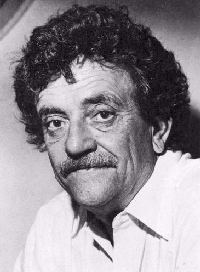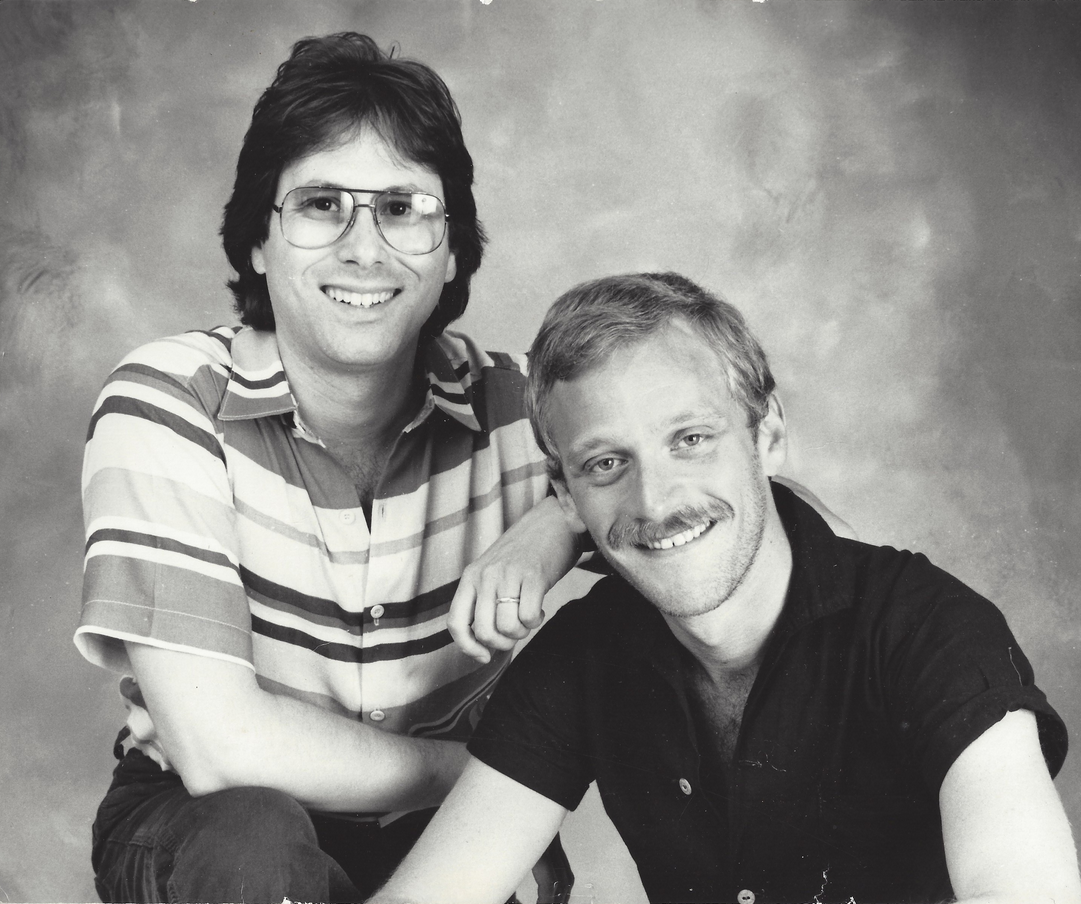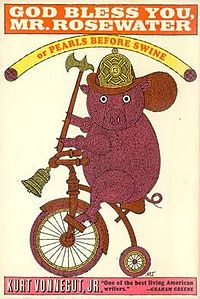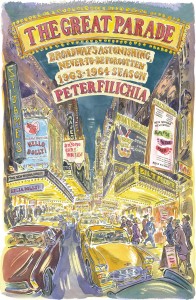Filichia Features: When Alan Menken said “God Bless You”

Filichia Features: When Alan Menken said “God Bless You”
 Kurt Vonnegut
Kurt Vonnegut
If you were in college in the ‘60s and ‘70s, you were probably reading Kurt Vonnegut, Jr. even during the time you’d earmarked for physical science or calculus.
The Baby Boomer generation was intoxicated with everything that maverick novelist Vonnegut (1922-2007) wrote. Campus quadrangles were filled with kids reading paperbacks of what was then his entire oeuvre of nine novels, from Player Piano (1950) to Slapstick (1979).
The one they seemed to like best – and that Vonnegut himself thought his finest -- was Cat’s Cradle. When he was asked to grade his own work, he gave an A-plus to this fanciful 1963 novel about a banana republic whose top banana has a very secret weapon.
Soon after publication, Broadway producer Hillard Elkins optioned the property and planned to make it into a musical. As it turned out, Elkins instead chose to channel his energies into Oh! Calcutta! which wound being Broadway’s second-longest running revue, thanks to its full frontal (and full dorsal) nudity. (Elkins had asked Vonnegut to submit a sketch, but the author declined the offer.)
Still, as late as 1971, Elkins was telling Christopher Davis, his biographer, that “I think Cat’s Cradle will be done shortly.” In 1972, when a one-hour special of Vonnegut’s writings reached TV, the end credits acknowledged that the show’s producers needed Elkins’ permission for the Cat’s Cradle sequences. But Elkins never even got around to hiring a bookwriter or songwriter(s), so the project never happened.
However, Vonnegut fans should know that there has indeed been a musical version of one of their beloved author’s books, one to which he gave an “A” during that same grading session. It’s his 1965 novel God Bless You, Mr. Rosewater, which, in 1979, was musicalized by Howard Ashman, Alan Menken and Dennis Green.
You may not know the last name, but you probably know the first two. Ashman and Menken’s next collaboration was Little Shop Of Horrors. Not long after, they headed to Hollywood where they wrote The Little Mermaid and Beauty and the Beast, the latter of which, sad to say, Ashman never lived to see. But Menken has remained a steady force in Broadway and Hollywood music and is one of the reasons why so many millennials care about musical theater.
Music Theatre International is now offering God Bless You, Mr. Rosewater for production. “By the authors of The Little Mermaid and Beauty and the Beast!” should get many patrons through the doors.
However, while some of the musical is cartoonish (in the best sense of the word), this show isn’t at all similar in tone to the Disney classics. Vonnegut was a delightfully off-the-wall author, and Ashman, Menken and Green stayed true to his tone. If they hadn’t, would Vonnegut’s daughter Edith have become lead producer of this off-Broadway musical?
If you don’t know the novel, it’s the story of Eliot Rosewater, president of The Rosewater Foundation, which has been funded by his family’s wealth – the fourteenth largest fortune in America. When the show opens in 1979, the ledger reveals $87,472,033.61. As Daddy Warbucks says in Annie, “That was a lot of money in those days.”
But shyster lawyer Norman Mushari feels he just might be able to take control of both the foundation and the fortune if he can get Eliot Rosewater judged insane. And because Eliot is, as the authors describe him, “often distracted, slightly unkempt and an athlete gone to not seed but lard,” our eager-beaver legal-eagle Mushari sees Eliot as easy prey.
Adding to Mushari’s claims that Eliot is mad is his willingness to fund esoteric projects. (“We built a ‘Y’ in Tenafly, and two in Tennessee.”) Eliot even dispenses a check to a would-be-author who thinks the world needs a biography of Butterfly McQueen. (Maybe that’s not so crazy; one was indeed published in 2007.)

God Bless You, Mr. Rosewater - First Edition (Hardcover)
Although a poet who asked Eliot for a $10,000 grant walked away with a cool $50,000 instead, that’s a droplet in the bucket compared to what Eliot gives his favorite author, Kilgore Trout. Eliot admires this novelist who has a sci-fi mind as wild as – well, Kurt Vonnegut’s. Case in point: Trout’s vision of the future, which we see in a quick scene, shows that average Americans feel their lives are so meaningless and expendable that they voluntarily go to “Ethical Suicide Parlors” where they can choose one of fourteen painless ways to die. The end!
Eliot wants to prevent that from becoming a reality. He takes seriously that oft-quoted inscription on the Statue of Liberty – “Give me your tired, your poor, your huddled masses yearning to breathe free …” Here in Rosewater County, Indiana, such “wretched refuse” as ex-convicts, the long-unemployed and the people who are still struggling to find their place in the world make phone calls to Eliot. This ultra-humanitarian always comes through for them so that they can be less tired and less poor. His munificence causes the hoi-polloi to sing “Look Who’s Here,” one of Menken’s most tender and beautiful waltzes.
(There’s a caveat here, however. The only way you’ll hear this song is in your head, and only if you can read music. There hasn’t been a Rosewater cast album – not yet, anyway. Perhaps your production will lead to one.)
If a man is this generous, Mushari reasons, he must be insane, right? Eliot’s psychiatrist has deemed him incurable. And Sylvia Rosewater increasingly feels that madness is not an unfair charge to level against her husband. How about that time they went to the opera, and as the entombed Radamès and Aida did their final aria, the oxygen-conscious Eliot roared “They’ll last a lot longer if they don’t sing!” If that weren’t enough, he stood up and yelled to the stage “Stop! Stop singing!” Eventually, Sylvia, not Eliot, is driven mad and must be committed.
If you want to make it up to the people you didn’t cast in Urinetown – or to give new roles to the ones you did choose – Rosewater is the show for you. The depressed-looking people that populated that 2001 hit are second-cousins to those who depend on Eliot – as well as the members of the Volunteer Fire Brigade, another of his pet projects. Remember too that your leading man can (and even should) have the look of a character man, which can be a refreshing change. That handsome alpha male who played Trevor Graydon in Thoroughly Modern Millie and Johnny in THE UNSINKABLE MOLLY BROWN need not apply – not unless he wants to profoundly change his image.
No question that Rosewater is now a period piece. References to Howard Johnson’s, Green Stamps, Sears and Roebuck, E.J. Korvette’s, Johnny Carson, Elizabeth Taylor and Lawrence Welk tell us that we’re not in 2015 anymore.
And yet, obsolete brand-names and now-deceased celebrities aside, God Bless You, Mr. Rosewater still has a great deal to say about today’s America. So many of our towns that in 1979 were experiencing a slow and steady death after industries had fled have become even more deserted in the ensuing thirty-six years. To paraphrase a Lee Adams lyric, “Mister, we could use a man like Eliot Rosewater now.” At least delivering the message in a Menken-and-Ashman musical makes us face the truth in a more palatable way.
 You may e-mail Peter at pfilichia@aol.com. Check out his weekly column each Tuesday at www.masterworksbroadway.com and each Friday atwww.kritzerland.com. His book The Great Parade: Broadway’s Astonishing, Never-To-Be Forgotten 1963-1964 Season is now available at www.amazon.com.
You may e-mail Peter at pfilichia@aol.com. Check out his weekly column each Tuesday at www.masterworksbroadway.com and each Friday atwww.kritzerland.com. His book The Great Parade: Broadway’s Astonishing, Never-To-Be Forgotten 1963-1964 Season is now available at www.amazon.com.

























